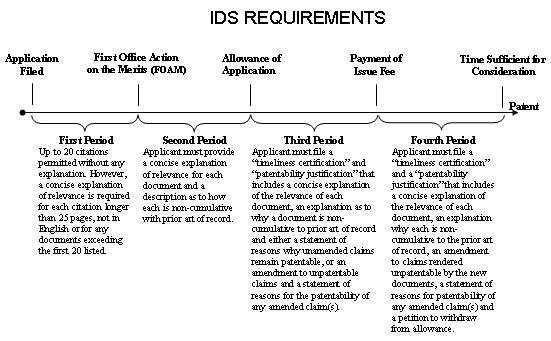The U.S. Patent and Trademark Office (USPTO) has announced that the executive branch has approved the new Information Disclosure Statement (IDS) rules proposed by the USPTO in an official Gazette notice issued in July 2006. The new rules could be implemented as early as January 2008.
The rules changes impose "additional disclosure" requirements for IDS that encourage applicants to submit an IDS citing a limited number of documents (20) before issuance of a first Office Action (OA). Specifically, under the proposed new rules there is no "additional disclosure" required when submitting an IDS before issuance of first OA if the number of citations is 20 or less—except in the case of large documents (more than 25 pages) or foreign language documents. The proverbial "stick" side of the motivation is in the form of increasingly burdensome additional disclosure requirements (see chart below) applicants will encounter when filing an IDS after a first OA. The following timeline is based on one published by the USPTO to explain the "additional requirements" of the proposed IDS rules, requirements that grow increasingly burdensome as the application moves through each of the four time periods set forth in the proposed rules. Also, under the proposed rules, all IDS fee requirements will be eliminated.

The content of this article is intended to provide a general guide to the subject matter. Specialist advice should be sought about your specific circumstances.


